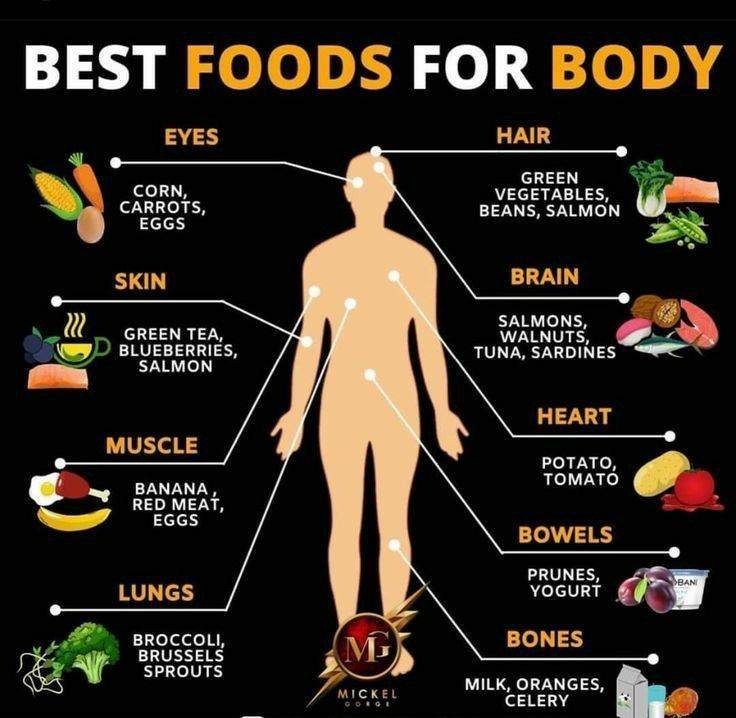Best Food for Your Body:
A Guide to Optimal Nutrition
When it comes to fueling your body, not all foods are created equal. The best foods for your body provide essential nutrients, vitamins, and minerals that support your energy, immunity, digestion, and overall wellness. Eating nutrient-rich foods can improve your health, increase your vitality, and help you feel your best every day. Here’s a breakdown of some of the top foods for optimal health.
---
1. Leafy Green Vegetables
Examples: Spinach, kale, Swiss chard, collard greens
Benefits: Leafy greens are packed with vitamins A, C, E, and K, fiber, iron, calcium, magnesium, and antioxidants. They support heart health, reduce inflammation, and strengthen the immune system. They’re also low in calories, making them ideal for weight management.
2. Berries
Examples: Blueberries, strawberries, raspberries, blackberries
Benefits: Berries are rich in fiber, vitamins (especially vitamin C), and antioxidants like anthocyanins, which reduce oxidative stress. They support brain health, reduce blood pressure, and protect against chronic diseases, including cancer.
3. Nuts and Seeds
Examples: Almonds, walnuts, chia seeds, flaxseeds, pumpkin seeds
Benefits: Nuts and seeds are high in healthy fats, protein, and fiber. They’re also great sources of magnesium, zinc, and vitamin E, which support heart health, improve brain function, and reduce inflammation.
4. Fatty Fish
Examples: Salmon, sardines, mackerel, trout
Benefits: Fatty fish are abundant in omega-3 fatty acids, protein, vitamin D, and B vitamins. Omega-3s reduce inflammation, support heart health, improve mood, and are crucial for brain function. Eating fish twice a week is recommended for optimal benefits.
5. Whole Grains
Examples: Brown rice, quinoa, oats, barley, farro
Benefits: Whole grains are packed with fiber, B vitamins, iron, magnesium, and antioxidants. They support digestive health, help regulate blood sugar, and provide sustained energy. Whole grains are also linked to a lower risk of heart disease and diabetes.
6. Cruciferous Vegetables
Examples: Broccoli, cauliflower, Brussels sprouts, cabbage
Benefits: Cruciferous vegetables are rich in fiber, folate, vitamins C, E, and K, and compounds like sulforaphane that help reduce cancer risk. These veggies support detoxification, boost immunity, and aid digestion.
7. Legumes
Examples: Lentils, chickpeas, black beans, kidney beans
Benefits: Legumes are loaded with fiber, protein, iron, and folate, making them a great plant-based protein source. They help regulate blood sugar, improve digestive health, and reduce the risk of cardiovascular disease.
8. Fermented Foods
Examples: Yogurt, kefir, kimchi, sauerkraut, kombucha
Benefits: Fermented foods are rich in probiotics, which promote gut health by balancing the microbiome. A healthy gut supports better digestion, stronger immunity, and improved mental health.
9. Citrus Fruits
Examples: Oranges, lemons, grapefruits, limes
Benefits: Citrus fruits are high in vitamin C, fiber, and antioxidants. They help boost immune function, improve skin health, and reduce inflammation. Their fiber content also aids in digestion and helps lower cholesterol.
10. Avocado
Benefits: Avocados are high in healthy monounsaturated fats, fiber, potassium, and vitamins C, E, and B6. These nutrients support heart health, improve skin health, regulate blood sugar, and help with the absorption of fat-soluble vitamins.
11. Sweet Potatoes
Benefits: Sweet potatoes are a great source of fiber, vitamins A and C, potassium, and antioxidants like beta-carotene. They’re beneficial for eye health, immune support, and can help stabilize blood sugar levels due to their high fiber content.
12. Garlic and Onions
Benefits: Both garlic and onions are rich in antioxidants and contain compounds like allicin that promote heart health, reduce inflammation, and boost the immune system. They also have antibacterial and antiviral properties, making them helpful for fighting off illnesses.
13. Olive Oil
Benefits: Olive oil is high in monounsaturated fats and antioxidants, especially extra-virgin varieties. It’s known for supporting heart health, reducing inflammation, and providing powerful antioxidants that combat oxidative stress.
---
Tips for Incorporating These Foods
Balance is Key: Incorporate a mix of these foods into your diet. Aim to eat a variety of fruits, vegetables, proteins, and healthy fats to ensure a broad spectrum of nutrients.
Choose Whole Foods Over Processed Foods: Whole foods retain their nutrients and are free from additives and preservatives often found in processed foods.
Plan Ahead: Preparing meals with these foods in mind can make it easier to stick to a nutrient-rich diet.
Listen to Your Body: Everyone’s nutritional needs are unique. Adjust portion sizes and frequency based on your activity level, goals, and how different foods make you feel.
Eating the best foods for your body doesn’t have to be complicated. Incorporate more nutrient-dense, whole foods like leafy greens, berries, nuts, fatty fish, and whole grains, and make adjustments that suit your lifestyle and preferences. The benefits of prioritizing these foods are numerous, from boosting immunity and energy to promoting long-term health and wellness.
Thanks for reading 📚
MOÃSE




No comments yet
Be the first to share your thoughts!